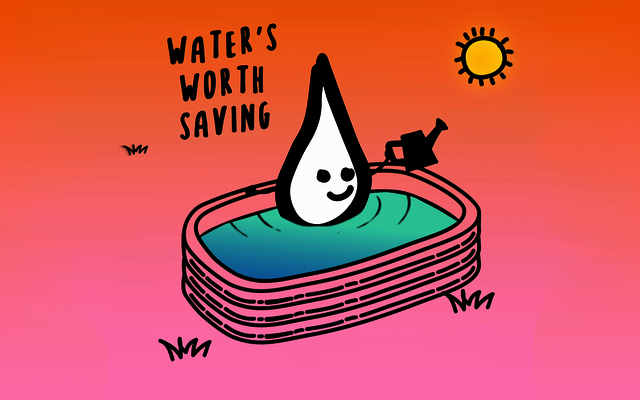News
Brits urged to be ‘water savvy’ as small changes could help save almost £500 a year on bills
- New research shows 81% of people are concerned about the cost of their energy bills this winter
- The average household of four could save £472 per year by making small changes to save water
- Only one third (30%) think it is important to save water during winter, compared with almost 80% during the summer
- Water UK is encouraging the public to be ‘water savvy’ and save water during the winter to save money on bills and reduce the risk of severe drought next summer
Water UK is helping the public to be savvy about their water use this winter, so consumers can save money on their bills while doing their bit to replenish water stocks ahead of next summer.
Taking small steps to save water will help households save money, not only on their water bills but on their energy bills too – heating water makes up almost a fifth (18%) of the cost of a household energy bill. Water UK found that 81% of people are concerned about the cost of their energy bills this winter.
Despite the weather getting colder and wetter during the winter, the record-breaking dry and warm weather this summer left reservoir stocks in England at their lowest levels on record. While the rainy weather is helping to alleviate the damage, some parts of the country remain in drought. The public are being encouraged to reduce their water use this winter to help prevent further restrictions next year.
New research from Water UK found that less than a third (30%) of people recognise the importance of saving water during the winter, compared to 80% of people who said it was important during summer.
For the first time, industry body Water UK is running its national summer Water’s Worth Saving campaign throughout the winter months. The campaign will show why saving water during the winter matters, as well as offering hints and tips on how to save water, and energy, in the home.
Collectively, we can make a big difference by making small changes, while easing the pressure of the cost-of-living crisis. This could include:
| Fixing leaks in your home
Reduce your water waste by fixing leaks – a leaky loo wastes between 215 and 400 litres of water per day |
Turning off the tap when brushing your teeth
If each person runs the tap while brushing their teeth for two minutes, that's 24 litres a day wasted! Turning off the tap could save £40 per year |
| Washing clothes at a lower temperature
Running your washing machine on 30 degrees and using it once a week less will save £34 a year from your energy bill |
Only using appliances when full
Washing machines use on average 60 litres per cycle, and a dishwasher uses 10 litres of water each time |
| Taking a shorter shower
Taking a 4 minute shower could save a household of four £165 a year on their energy bills and a further £100 on water bills |
Using an energy efficient shower head
Switching to an aerated shower head could save a household of four £75 off your energy bills per year and a further £45 off your water bill |
| Invest in a water butt for your garden
The average roof collects 85,000 litres of rain a year, enough to fill a water butt 450 times |
Only boil what you need
Avoid overfilling the kettle and save yourself £13 a year on your electricity bill |
The water industry is also doing its part. Ofwat figures released earlier this year show leakage has fallen each and every year since 2018-19 and is now at the lowest level ever recorded. Companies also have ambitious plans using new technology and innovation to halve leakage by 2050.
Peter Jenkins, Director of Campaigns at Water UK, said:
“Our research shows an overwhelming majority of the public are worried about the cost of their bills this winter. By making small changes such as taking a shorter shower, we’ll all be able to save energy and money on our household bills this winter, while doing our bit to help replenish vital water stocks.”
Joanna O’Loan, knowledge manager at Energy Saving Trust said:
“We all need water and use it in so many ways around the home, however many of us may not realise that each time we use it, we also use energy too. Making small changes in order to use less water can reduce our household bills and carbon emissions, while helping conserve this important resource.”
Emma Clancy, Chief Executive of the Consumer Council for Water (CCW), said:
“It will take much more than the recent rainfall for the environment to fully recover from our scorching summer, which is why it’s so important we all continue to use water wisely this winter and beyond. There remain significant cost of living benefits to saving water which can take some of the heat out of energy and water bills, through simple steps like shortening your time in the shower or always ensuring your washing machine is fully loaded. Water companies also have a wide range of assistance schemes – like social tariffs and payment breaks - to help the one in ten people who tell us their water bill is unaffordable.”
ENDS
Notes to editors
- Savanta surveyed 2,238 UK adults online between 28th-30th October. Data were weighted to be nationally representative of all UK adults by age, gender region and social grade.
- Water’s Worth Saving is a joint initiative between Water UK and Waterwise to help the public save water this summer. More information on the campaign is available here
- Energy saving statistics are from the Energy Saving Trust, an independent organisation dedicated to promoting energy efficiency, low carbon transport and sustainable energy use. More tips can be found here: https://watersworthsaving.org.uk/top-tips/indoors/
- Energy savings are for a four-person, gas-heated home in Great Britain, using a gas price of 10.3p/kWh and electricity price of 34.0p/kWh (based on Energy Price Guarantee October 2022). Water savings are based on average occupancy. Correct as of 1 October 2022.
- Headline figure is based on for an average household of four taking the following water saving measures: washing clothes at a lower temperature; taking a shorter shower; using an energy efficient shower head; avoid overfilling the kettle. Note that to reach the amount saved in the combined figure a water meter is required.
- In July, Ofwat highlighted that industry wide leakage has been reduced by 11% since 2017-18, heading towards the target of a 50% reduction by 2050.






